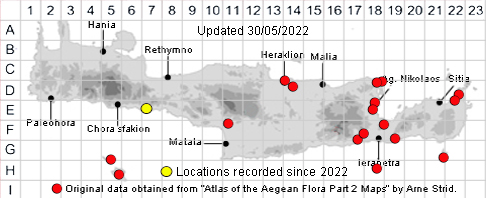
SPECIES DESCRIPTION
AJUGA IVA
Family and Genus:- See- LABIATAE
Common Names:- Southern bugle
Homotypic Synonyms:- Bulga iva, Chamaepitys iva, Teucrium iva.
Meaning:- Ajuga (L) Corrupted Latin for abortifacient (in Pliny, abigo, to drive
away).
Iva (L) A name used by the Roman monk Rufinus of Aquileia for
various fragrant plants.
General description:- Tufted, growing in tight groups, perennial.
Stems:-
1) 5-15 cm, woody at the base, usually much-branched, villous or lanate-villous.
Leaves:-
1) 14-35 x 3-6(-8) mm, linear or linear-oblong, entire or with 2-6 short lobes.
Flowers:-
1) 2-4 at each node.
2) Bracts, similar to the leaves, exceeding the flowers.
3) Calyx, 3·5-4·5 mm, the teeth as long as or shorter than the tube.
4) Corolla, 12-20 mm, purple, pink or yellow; tube exceeding the calyx; upper lip
entire.
5) Stamens, exserted; filaments hairy.
Fruit:-
1) Nutlets, 4, reticulate-veined or transversely rugose,1-seeded.
Key features:-
1) Leaves, 3-6(-8) mm wide, linear to linear-oblong; entire, toothed or shallowly
lobed.
2) Stem, 5-15 cm, procumbent.
3) Corolla, lower lip pink or yellowish, without conspicuous veins.
Habitat:- Open dry shrubby vegetation, olive groves, open coniferous woodlad, along
tracks. 0-400(-700) m.
Distribution:- Widespread across the Aegean, mainly around coastal areas.
Sporadic and variable distribution on Crete mainly in the east.
Flowering time:- Late Mar to June, and sometimes again in Sept-Nov.
Photos by:- Fotis Samaritakis
